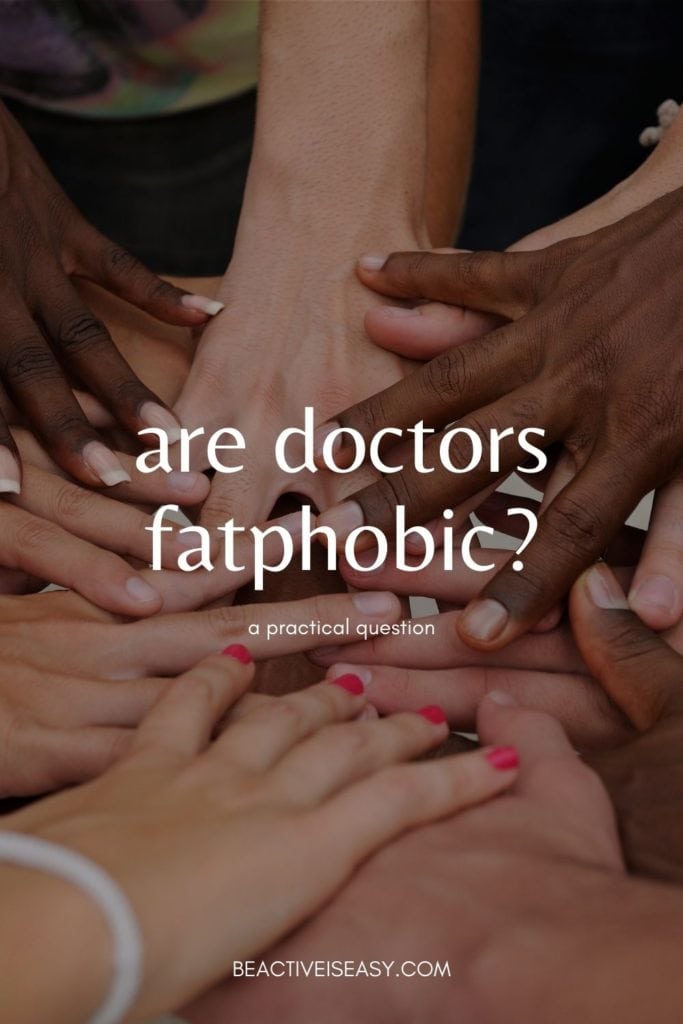Are Doctors Fatphobic? How Does Social Media Affect Your Mental Health?
Have you been seeing this trend of shaming fatphobia?
Are you just now seeing this trend via TikTok or other social platforms, both with positive or negative takes from this trend?
Do you know that our body image perception can be heavily affected by what we see every day?
The article you are reading right now addresses the questions, “Are Doctors Fatphobic?” and “How social media might affect your physical and mental health in this day and age?”

Summary
What Does Fatphobic Mean?
Before we start the conversation, let us talk about the meaning of the word, fatphobic or fatphobia in its noun form. The word can be broken down into two parts, “fat” and “phobia”.
In this case, “fat” acts as an adjective to describe the state of being overweight or obese. “Phobia”[1] means intolerance or aversion, according to the Merriam-Webster Dictionary.
The two parts put together, roughly means the aversion for overweight or obese people. It does have a negative connotation. How does this word come about when it describes such negativity?
One quick search on Urban Dictionary will show you that the word is a reaction from the overweight/obese community on the bullying they have suffered from looking different.
Right now, the word is ridiculed by the online community, mostly because the people who use it tend to go to the extreme. Basically, we go from making fun of how people look to not caring about our bodies at all.
Related post: The Best Exercises to Build Glutes By 40 Fitness Experts
The Problem of Obesity
Obesity rates are high in the United States, and there is much debate about what is causing this epidemic. The problem remains the same. From 1999 – 2000 through 2017 – 2018, the obesity rate in the US increased from 30.5% to 42.4%[2].
Some people argue that the medical community is to blame because they are over-prescribing medications and treatments that lead to weight gain. Others say that people are responsible for their own weight and that it is up to them to make healthy choices.
There is no one answer to this question. The medical community can certainly do more to help people maintain a healthy weight, but individuals also need to be proactive in their own health.
Related post: What the “Body Positive Movement” Is Not About
Let me remind you. Being obese is not healthy. Obesity increases your risks of heart disease, stroke, type 2 diabetes, and certain types of cancer[3]. Instead of enjoying life, you will suffer for the last two decades of your life, which sounds awful.
There are many ways to lose weight and get healthy, and it is important to find a plan that works for you. There is no magic solution, but by making small changes in your diet, exercise, and other healthy lifestyle changes.
Are Doctors Fatphobic?
There is a lot of discussions these days about whether or not doctors are fatphobic. Some people believe that doctors have a bias against people who are overweight or obese and that this bias leads to poorer health outcomes for patients. “My doctor blames everything on weight.” — a common complaint we often hear, especially from women.
Others argue that doctors simply have a lot of evidence that shows that being overweight or obese is bad for your health and that they are not trying to be mean when they give patients advice about losing weight.
Are doctors fatphobic? Ultimately, the answer to medical fatphobia is complex and likely varies from doctor to doctor. However, it is important to be aware of the possible existence of a fatphobic bias and fatphobia in healthcare statistics in the medical community and to work to overcome it.
Social Media Affects Us All
Ain’t this is why you are here?
The Raw Reaction of Fatphobia and Are Doctors Fatphobic
Maybe this is the main reason why you are here. The trending videos on TikTok on fatphobia or even on fitphobia, the opposite end of the spectrum.
@love4fatties Reply to @user7maeb615rg ♬ original sound – Kayleigh
A video like the one above[4] may go viral with the provocative nature of the narrator. We can see the power of social media here.
The more reactions, either negative or positive, the more promoted these videos are and more people will get to see them on their “For You” page.
Maybe this is the main reason why you are here. The trending videos on TikTok on fatphobia or even on fitphobia, the opposite end of the spectrum.
A video like the one above may go viral with the provocative nature of the narrator. We can see the power of social media here.
The more reactions, either negative or positive, the more promoted these videos are and more people will get to see them on their “For You” page.
The comment is disabled on the video. However, if you listen carefully, you can see that the person compares “fatphobia” to racism. Really?
We go from “are doctors fatphobia?” to equating them wanting people to lose weight because they do not want to look the same way?
The argument is hyperbole. It represents a black-and-white argument that we, the audience, have to choose a side to be in. In reality, there is no such side.
Arguments like this one, exaggerate scientific findings to some kind of character judgment. It is not helpful to either side. Why do we have to put the other side down?
Doctors can make mistakes, can be truly condescending to our bodies, and indifferent to our struggles (trust me, my worst client was a cardiologist). Medical shaming is a thing. At the same time, obesity can make your life worse and increase your risk of getting chronic diseases.
Want to create a new habit system without worrying about fatphobia? Look no further than the FREE Habit Forming Checklist. Click the link below to receive a personalized plan on how to should exercise!!
Acknowledge Instead of Asking Are Doctors Fatphobic
Social media has been our life in the past few years. We are more connected to each other than ever. That said, it also brings us problems.
We will focus on Instagram for our discussion. In a recent study, the researchers concluded that the slim-thick body image ideal gives us more body and weight dissatisfaction[5].
The slim-thick body is a new type that is very popular on Instagram. Instead of being as thin as a stick, the models now have “thiccc” parts at the more desirable parts, like the botties and buttocks.
People are now asking questions such as “how do I make my buttocks bigger but still keep my legs slim?” This kind of question is even more nuanced than “are doctors fatphobic?”
By the way, the answer is mostly like (99%) impossible. Your body is not a piece of dough. You cannot go in and shape it however you like (of course, surgery is a possibility).
The slim-thick ideal is an example of how our minds react to social media. The same can be said for fatphobia. It is not about “are doctors fatphobic?” It is about how you look at yourself.
You can still exercise and lose weight without feeling the shaming of not belonging. On the other hand, how you look should not be used to judge your characters.
If you are fat, you are not lazy. Those two are not mutually inclusive. Remind yourself this when negative thoughts come up in your mind.
What to Do Then If We Stop Asking Are Doctors Fatphobic?
Fatphobia. Institutional fatphobia. Fatphobia gym. Are these problems exist? Yes. Is it as common as social media makes it out to be? No.
Instead of letting yourself be trapped in the cycle of self-hatred and hatred for other people, you can make a change in how to catch yourself in the middle of the flood.
You should think about self-coaching. Ask yourself the following questions when you feel the negativities come up:
- What is happening to me?
- What do I make it mean about me?
- Is it something other people want me to do or do I want to do it?
- Do I have any control over the situation?
- What does it make me feel about myself?
- Last but not least, are doctors fatphobic? (⊙ˍ⊙)
For more instructions on how to lead your mind through the trenches, introducing “Evolve from Negativities,” a mini-course on how to guide yourself through the adversities of social media and social pressure.
You will get access to self-coaching and SMART goal training to stand up for yourself and move away from group thinking. Imagine yourself feeling confident with every single decision you make without asking for validation? That is how you will feel after this mini-course.
Jump in to see more bonuses such as a free recipe library and blog articles without the intrusive ads!
Sources:
- https://www.merriam-webster.com/dictionary/phobia
- https://www.cdc.gov/obesity/data/prevalence-maps.html#overall
- https://www.cdc.gov/ncbddd/disabilityandhealth/documents/PD_HW_Obesity-Prev.pdf
- https://www.tiktok.com/@love4fatties/video/7061298855639289134
- https://www.sciencedirect.com/science/article/abs/pii/S1740144521001546




 !!
!!

